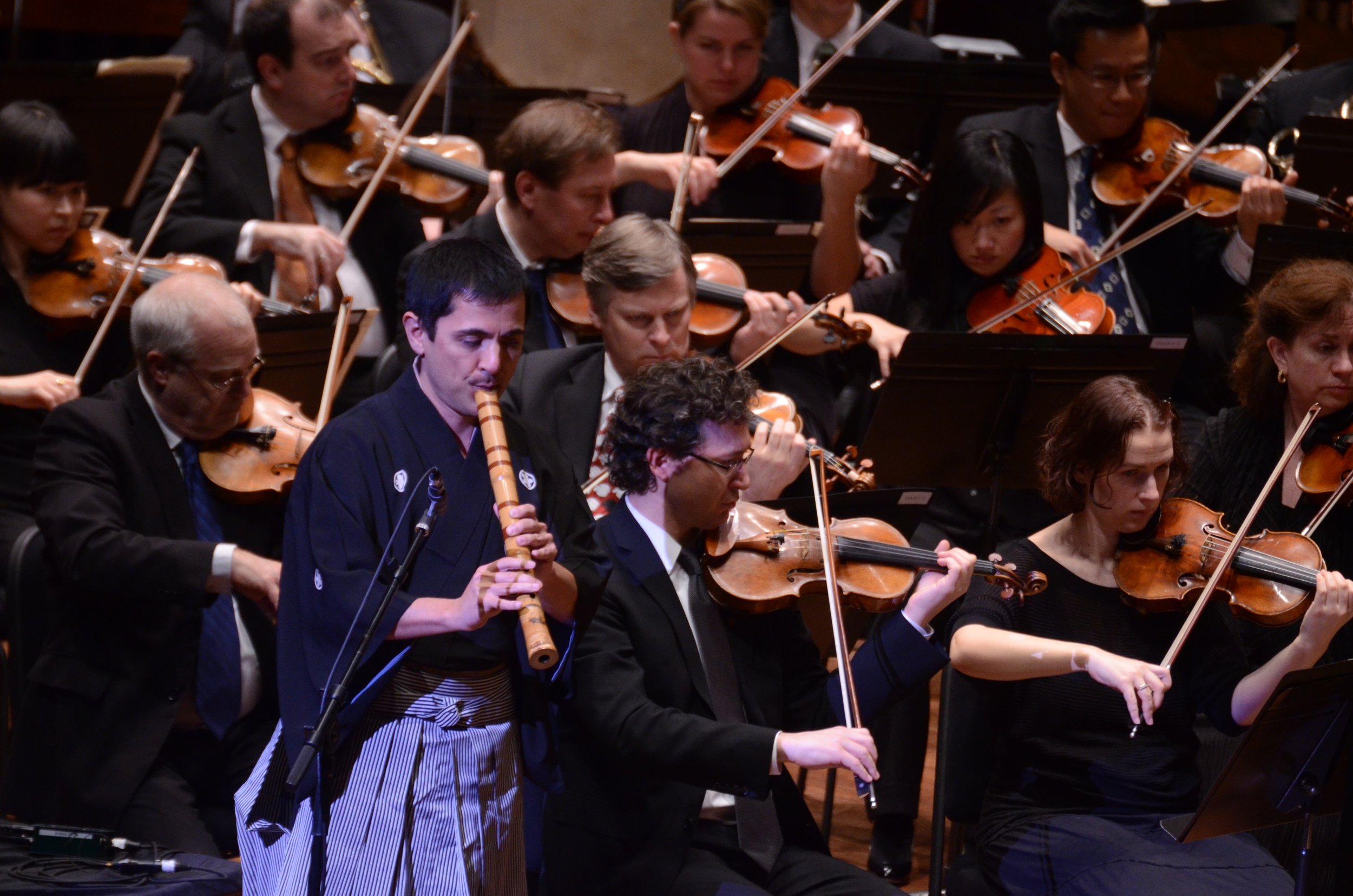On Composing…
In 2013, I was invited to be a featured soloist with the Seattle Symphony at Benaroya Hall for a concert entitled, “Celebrate Asia.” The piece I was to perform was a new work called Suizen, which had been selected from several submissions. The composer used the shakuhachi for inspiration (his own specialty was the pipe organ, amazingly) thus my inclusion.
photo by Don Pham
It was a memorable and wonderful experience playing to a standing room only crowd of 2,500 people. The conductor, Stilian Kirov, was a brilliant and I might add, very patient man, and I was humbled by the talent amassed on that stage.
Including the actual concert, we had three opportunities to play Suizen; one rehearsal, a dress rehearsal, then showtime. One of my favorite moments came during dress rehearsal while the stage manager was arranging for my music stand (I had written out my part in ro-tsu-re shakuhachi notation). While everyone was waiting, one of the violinists said, very tongue-in-cheek, what, you haven’t memorized it?
I thought about it for a second and realized, well, yes I had. Before curtain, I let the stage manager know I wouldn’t be needing the music stand after all. It was incredibly freeing to play by heart. Had she not given me that good natured ribbing, I have no doubt my performance would have been a bit more stiff.
The music itself was beautiful but presented me with the usual challenges I face in those kinds of circumstances given that I don’t read 5-line staff notation. Thankfully, I was also told I had as much latitude as I needed, since the composer wasn’t familiar with the shakuhachi, or what its limitations may be. In fact, the key-center of the piece was more suited to a 1.7 (1 shaku and 7 sun, versus the typical 8 sun). I was very moved by the humility and respect for tradition on the part of the composer and conductor.
I had played with the Seattle Symphony one other time in the mid-90s for a recording of a medley of film soundtracks. I was unfamiliar with the film that I was playing on, but essentially my part was a duet with a recorder. I had a special assistant who tapped me on the shoulder when my part was coming. Again, kudos to the Symphony for being so accommodating!
As it was explained to me, my part was for a Native American-themed movie. Curiously, I was told the composer had to have shakuhachi for this part. He was intransigent on the matter. I had to wonder why but the answer was way above my pay grade. The part seemed much more appropriate for an ocarina, or—call me crazy—maybe a Native American flute? But I digress.
This leads me to some thoughts on composing new music for the shakuhachi. I find myself discouraged by the number of shakuhachi players who seem to work hardest at making the shakuhachi sound like something—anything—other than a shakuhachi.
Alternately, composers sometimes write Japanese-themed songs but are not versed in Japanese music and thus don’t consider the limitations of, or more importantly, the strengths of Japanese instruments. It is always immediately apparent. Instead, lines of music are written that are fed into a Musical Instrument Digital Interface (MIDI) with a shakuhachi setting. Conceptually, you’re playing a part based on concert flute, or some other western woodwind.
Thankfully, there are people like Elizabeth Brown who are composing music for the shakuhachi with a deep understanding of not only the instrument, but of its roots, and its contrast to western music.
Personally, I’ve been reluctant to share what I’ve written for fear of it being derivative or ponderous. Years ago, I wrote a handful of Irish tunes but they are cringeworthy to me now. I was not an experienced enough player at that point to warrant contributing so-called original music; in the end I wrote tunes that sound disturbingly similar to tunes that were already written—I just hadn’t learned them yet.
My father, performing Dōkyō in Boulder, CO
With shakuhachi music, my love for my father’s piece Dōkyō is so great that I couldn’t imagine writing something that compelling, not to mention my grandfather’s E Ten Raku, and Kodō II’s Tsuki no Kyoku. When I was younger, I think I worried my own music would be weighed against those masterpieces and found wanting. My fear mechanism for caring what others think has atrophied somewhat which is one of the few benefits of age. That and experience; I’m more confident I’m not just playing something someone else wrote and I just forgot the source.
All these various aspects of shakuhachi playing—or any musical discipline, really—require their own practice. Practice to study and learn the instrument and music; practice for performing; practice for writing. All three require their own attention. I’ve done the first two for nearly forty years now to the best of my ability. So far, dipping my toe in the third has been enjoyable.
my process is…messy.
一生懸命頑張ります。
More anon,
Hanz


